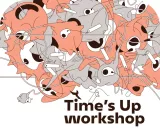The one day workshop with the Austrian collective Time's Up will facilitate participants to create imaginations of possible futures for the city, region and nation, developing humane, more than human and integrated visions and accommodations. It will build upon insights developed within and around the existing exhibition in the GAMPA gallery.
We invite participants to join us for a day investigating questions of mistakes, errors, misunderstandings and other false paths in the context of imagining the unpredictable future.
We will investigate errors and what may or may not be mistakes. We will examine several questions, as well as commonplaces such as: who determines what is false, by mistakes we keep learning, we are falling/failing forward, it's not a bug - it's a feature, .… Reflecting upon the social, technological, ecological, economic and political elements of mistakes and errors, we will seek the good in them and imagine worlds where mistakes are a part of everyday life.
We remind ourselves and reflect on mistakes as a natural part of the human and non-human world. As part of the workshop, we will speculate on the difference between an error and a mistake, and how these reflect and intertwine with imagining futures, with incomplete information, allowing mistakes and misunderstandings, adaptations, reconfigurations, new alliances and humility. If we do not allow mistakes, then we insist upon the perfect, and the perfect is sometimes the enemy of the good.
PARTICIPATION IN THE WORKSHOP FREE OF CHARGE, BUT REGISTRATION IS COMPULSORY.
Time's Up is an international group of artists founded in 1996 in Linz on the Danube, Austria, and based in the port area. The "Laboratory for Experimental Situations" develops a wide variety of spatial installations. Older works of the group mainly refer to questions, aspects and interactions of human perception, control and biomechanics. The more recent works of the group are characterized by a distinct narrative character. Accordingly, fictional or semi-fictional characters, stories and the design of the environment play a correspondingly important role in their current narrative productions and installations. Time's Up's oeuvre has been presented in Europe, the United States, Africa, Asia and Australia.
Lecturers:
Tina Auers' work oscillates almost carelessly between art, research, technology, entertainment and science. She has been part of Time's Up since it was founded in 1996. Together with the collective Time’s Up, she works on the creation, conception, implementation and evaluation of media-enhanced, interactively challenging, physically substantial architectures. These she understands as self-contained worlds that allude to scenarios of everyday life and possible future settings, that provide visitors/users and herself with a playful and fascinating approach to the mixed realities they proffer, that fan the flames of the spirit of discovery, and make the act of exploring these worlds and the narratives that animate them an all-encompassing experience.
Tim Boykett, was born and grew up in Australia, has been living in Austria since 1991. Operating between the areas of mathematics and media art, performance and interaction: the boundaries have been and remain fluid. As a continuing founding member of Time's Up, Tim has been involved in conceptualising, planning, building and presenting extended interactive mediated physical environments for the past two decades. There have been four main phases of work: the Hyperfitness Studio series, the BodySPIN series, the Sensory Circus and the current series of Physical Narratives. Interwoven in these developments and installations have been a series of smaller experiments, workshops, performances and other events. Essential to this work has been an ongoing theoretical development. Parallel to this, Tim has been active as a researcher in algebra, combinatorics and computer science with several publications in international journals. His work here has included the analysis of computational models for physical processes, modelling of processes and computation as well as structural analysis.


